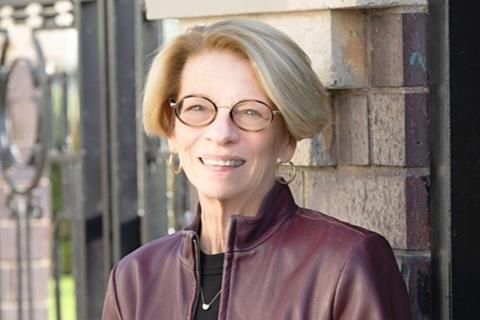A new city with high attendance costs, the giant shadow of a presidential election and the industry’s ongoing challenges have many grumbling about this year’s AFM. But Las Vegas is still set to host a busy, buzzy market.

As attendees head to Las Vegas for the first American Film Market (AFM) to take place outside Santa Monica in decades, they will have heard with interest that the new catchphrase from Mipcom was ‘Stay in the mix till 2026’.
Participants may well be asking themselves what fresh hell this is. After weathering Hollywood strikes, a pandemic, rising production costs, casting difficulties and the erosion of mid-budget theatrical prospects by deep-pocketed streamers, they can be forgiven for wanting to cling to this year’s mantra, ‘Survive till 2025’.
Whether the anticipated new dawn of calm and reason is being postponed by one year is a question that might be more easily addressed after AFM (November 5-10). The independent film space is populated with eager entrepreneurs and fighters who are used to not just surviving but thriving.
In addition to chronic industry pressure points, this year’s market brings a very particular set of challenges. Sellers are already annoyed over high costs at the Palms Casino Resort, where AFM organiser Independent Film & Television Alliance (IFTA) has had the good sense to choose a hotel that houses every market activity — exhibitor offices, more than 170,000 sq ft of conference and networking space, and the 14-screen Brenden Theatres multiplex — under one roof.
A number of leading US-based sales agents have been telling Screen International for some time that, while they are prepared to attend Las Vegas this time around, they want to return to the Los Angeles area in 2025. Some buyers from outside the US feel the same way: travelling to Las Vegas is more complicated and expensive, and they value being in Los Angeles where they append meetings with studios, agencies and producers to their AFM agendas.

IFTA president and CEO Jean Prewitt declined to tell Screen the term length of the arrangement with the Palms, although the organisation would prefer to settle in one place for a while after years of attendees griping about “having a market essentially explode across a whole geographic area and having to run back and forth” in Santa Monica.
“We think we’ve addressed that and think the hotel is lovely,” says Prewitt. “The facilities are all there. But, having said that, the marketplace makes its own decisions, up to a point. So we’re keeping our eyes on opportunities, just because that’s what you do. But in our heart, we hope this becomes a relatively long-term location and it works for the industry.”
Business will play out against a more existential backdrop. During Cannes, Toronto International Film Festival (TIFF) announced plans to launch an official market in 2026. The proximity of a new market, precisely what form that will take and what it means for the established AFM was the talk of Toronto. The subject will certainly rear its head at AFM.
Throw in arguably the greater existential topic, the US presidential election on the market’s opening day on November 5, and there is a lot on people’s minds. Given that Donald Trump and Kamala Harris are neck-and-neck in the polls, there is unlikely to be a clear result on the night, which will be a distraction and may influence trade in the corridors of the Palms over the ensuing days.
Overwhelming enthusiasm

Prewitt admits the independent business is in a tough moment. However, the decades-long champion of the sector prefers to accentuate the positive. “The enthusiasm for AFM is overwhelming,” she insists. “We are sold out for sales companies. Our numbers for buyers are outstripping last year and the year before, screenings are up, so everything signals that people are absolutely back to business in a way we haven’t seen since the pandemic. This is one of the first markets where everyone feels they know the buyers are going to be there to buy.”
IFTA will share full attendee numbers early in the market. In light of higher industry attendance at Venice and San Sebastian festivals and the more recent Busan, it is understood that some European buyers, as well as their counterparts in China and Japan, will stay away. That said, sellers are expecting a strong turnout. “There are people coming who don’t go to anything except Cannes,” says Todd Olsson, president of international sales for Highland Film Group. “The head honchos want to come to Vegas. There are quite sizeable delegations that only previously sent a few people.”

Like everybody, Highland is scrambling to assemble several packages in time to discuss with buyers, and will screen for the first time the horror film Rosario and Josh Duhamel action comedy London Calling, as well as Chuck Russell’s reimagining of the 1986 horror Witchboard. “Everybody’s looking for high quality and with artistic merit,” says Olsson.
And when they find it and distribute it well, it works. Two independent horror films are arguably the standouts of the year to date. Cineverse’sTerrifier 3, sold internationally in recent markets by The Coven, is a low-budget smash that has crossed $45m in North America and more than $50m worldwide at time of writing. Meanwhile, Neon celebrated its biggest ever hit in the summer when horror Longlegs, starring Nicolas Cage and Maika Monroe, earned more than $74m in North America and $100m worldwide.
Despite ongoing “softness” from some of the larger Asian markets, Prewitt notes: “We have a big Chinese umbrella stand to bring producers to sell Chinese content, not buyers to buy American independent content, which was largely put on hold four or five years ago. Somewhat of the same with Japan.
“The big Korean entities are there, but where we’re seeing traffic is from smaller Southeast Asian countries: Thailand has an umbrella stand; Malaysia is there; Vietnam in terms of buyers is there. It’s not quite as predicted. Two years ago, we would have said Asia is slow to come back — now it’s clear there have been some fundamental marketplace shifts, and we’ll all have to try to understand those over the next year.”
It bears repeating that the activity of the streamers, who have become pickier buyers in recent years, has made it hard for independents to acquire some of the more coveted packages, which in turn has dented the theatrical prospects of the more appealing mid-budget independent fare on offer. Netflix declined to comment on reports that it bid an eye-popping $150m for MRC’s upcoming Wuthering Heights adaptation, which has been snapped up by Warner Bros. Emerald Fennell will direct Margot Robbie, who is also producing, and Jacob Elordi.
Encouragingly, the blue-chip US sellers strive to transact with their independent buyers on a considerable chunk of their slates. And three cheers for MadRiver Pictures, which announced in Cannes it was partnering with nine top-tier companies on a multi-year equity financing and distribution arrangement to bring fully financed films to market in the $25m-$75m range.
MadRiver CEO Marc Butan will be checking in at AFM with his partners, which include DeAPlaneta in Spain, Eagle Pictures in Italy, IDC Distribution in Latin America and SND in France. “These are substantial companies,” says Butan. “The goal is not to flip movies to Netflix and make a small margin; [the partners] want to build IP value. It’s about how we take more control of our destiny.”
The arrangement essentially means that, once a project is identified and greenlit, it is financed. The partners take their territory rights and collectively cover the equity gap. The more pre-sales from around the world, the smaller the equity gap. CAA Media Finance and MadRiver sister company The Veterans handle sales.
The first two projects are well underway. Jason Statham thriller Mutiny has largely sold out — with Lionsgate committed to a wide theatrical release — and recently relocated to Malta after the UK portion of the shoot ended. Empire State, starring Gerard Butler, has been pre-selling and is scheduled to go in front of the cameras in early 2025. A portion will shoot in New York City.
“The market is strong for certain movies and challenging for others,” says Butan. “[This network] was set up to give distributors a steady flow of projects they can get involved with earlier. It allows me to offer filmmakers a fully financed solution. I can really make films upfront.
“Distributors are pre-buying a lot of movies and they don’t know what is going to get made,” he adds. “[With this partnership] they understand the value of the IP — these movies are designed as franchise-starters. That’s valuable to them.”
Independent opportunity

Pia Patatian, an experienced sales executive who has worked at Arclight Films and Capstone Pictures, has just launched her new company Concord Studios with the goal of bringing 12-15 projects across all genres to market each year.
“Now is a good opportunity for independents because writers and directors are coming to independent producers with good material, and at the end it’s the script and the director that attract cast,” says Patatian, who arrives with a slate that includes Barry Levinson’s JFK conspiracy project Assassination starring Jessica Chastain, Brendan Fraser, Bryan Cranston, and Al Pacino. “It’s a good moment for me to start this company.”
On the matter of being at the Palms, some European sellers claim their costs are running 20% higher than they were in Santa Monica, which already presented a high cost base. Prewitt could not confirm that differential, and says she and her team have fought hard to keep costs down.
IFTA has maintained the same costs for badges, screenings and offices where comparable charges existed in Santa Monica — costs that the organisation can control. Sleeping accommodation is generally less expensive than in Santa Monica and IFTA says exhibitors benefit from “substantially more [office] space” and easy access to other amenities.
Prewitt says she and her team have fought hard to make the market as affordable as possible, but fully acknowledges there are cost differences in moving from Santa Monica. AFM benefited from its longevity in the location and is now the new kid on the block, negotiating with new vendors in a conference city and seeing inflation-adjusted prices passed on to exhibitors.
There has been some success. When IFTA began negotiations last spring, no coffee makers were allowed in the offices. The organisation has ensured Nespresso machines can be rented from the hotel at $750 for a single-serve machine and 100 pods. While high, it says the price is much lower than the initial quote.
Exhibitors will be charged for disconnecting television sets from a network managed by an outside telecom company, which are effectively unusable for plugging in Roku sticks or other devices. After testing sessions, the vendor and the Palms are prepared to disconnect the system, create necessary connections and reinstall, for a price. Alternatively, exhibitors can bring in their own television without charge — easier said than done away from home.
Prewitt says: “There’s no question that on the margins there are costs associated with being in Las Vegas that might well have been charged if we had just moved from Santa Monica to another big hotel in Los Angeles or another city.”
With regard to a potential market clash with TIFF, people are still unclear exactly what form the latter will take. US sellers have said they would be interested in a fully fledged market, although they add that TIFF would need to move its dates back a week or two, possibly even into October, to allow time after the summer to put together packages.
“Wherever the sellers and buyers go, that’s where it’s happening,” says one sales executive who asked not to be named. Another opines: “If the AFM goes back to Santa Monica and buyers come back in the middle of November, people will prefer AFM in Santa Monica. But if we give them the possibility of choosing between Toronto or Las Vegas, they’re going to choose Toronto.”
Prewitt says it would be hard for people to accommodate a market between Cannes and AFM, given the short space of time to prepare new projects. “I go back to the sell-out nature of this year’s AFM, which shows pretty firmly how wedded the industry is to this early November market,” she says. “It works for them so, in that sense, we feel we’re in the right place and we’re doing the right thing. Toronto will develop the way Toronto wants to develop and we’ll see how it plays out.”























No comments yet